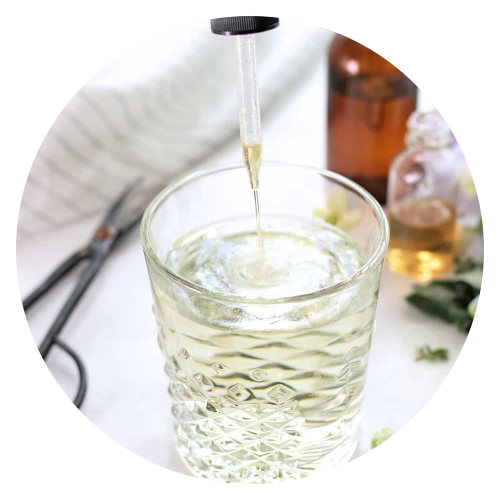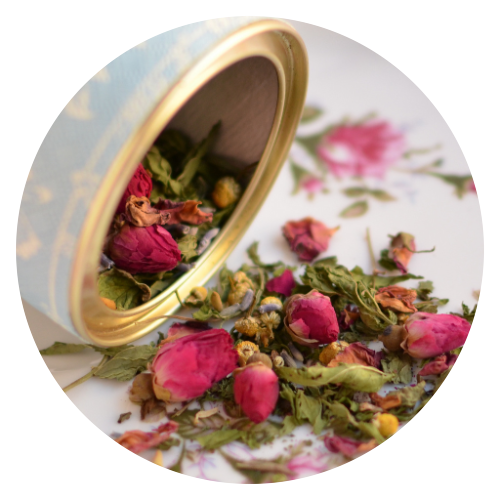Up The Honey Intake
Did you know that consuming wild, raw, local honey may offer a gradual desensitization to your seasonal allergies? Bees pick up the pollen from their environment, the same environment contributing to your seasonal allergies. Eating local honey slowly builds up your tolerance to the specific allergens contained in allergy shots. It is important to consume raw, local honey because raw honey has not been treated, pasteurized, or processed in any way. When consuming raw honey, you reap the benefits of local pollen collected by the honeybees.
Wear a Wide Brimmed Hat and Sunglasses
This is perhaps the easiest preventative step. Wearing a wide brimmed hat and sunglasses is a simple way of keeping pollen from settling on your face or blowing into your eyes and making them a red, itchy, watery mess.
Change Up Your Hygiene Routine
It is important to understand that allergens collect on hair, clothing, shoes, etc. Not only is there a threat of these allergens going airborne, there is also a threat of them entering your eyes when you inadvertently rub them. Follow these simple steps to reduce contamination of allergens.
- Change out of clothes and shower after spending time outside.
- Wash face and hands frequently
- Use saline nasal spray to rinse your nose after spending time outside.
- Use saline eye drops to rinse eyes.
Lay off the Beef
Choose chicken, fish, or plant based alternatives. A two-year study of 334 adults with hay fever and 1,336 without found those who had the most trans oleic acid in their diets, a form of monounsaturated fat found primarily in meat and dairy products, were nearly three times as likely to have hay fever as those who ate the least.
Prep Your Home Environment
A simple way to prevent seasonal allergies is to prepare your indoor environment. Here are some simple tips to follow:
- Before entering the house, remove shoes to avoid tracking outside pollutants onto carpets or rugs.
- Add a HEPA filter to your air conditioning system and change regularly.
- Avoid opening windows during seasonal threat
- Vacuum regularly, using a HEPA filter to help reduce animal hair and dander shed, along with dust mites and pollens.
- Limit the amount of allergen collectors such as decorative throw pillows and unnecessary layers of window dressings.
Try Aromatherapy
Using essential oils for allergies works aromatherapy by applying the oils to your body where they enter your bloodstream transdermally. Remember, you must always dilute the essential oils before using them on your skin, or use one of The Herbal Toad's already diluted roll-ons. Dilution rates vary for different oils, so be sure to check our label or listing for the oil that you are using.
-> Read our article, Best Essential Oils for Allergy Season
Try Aller-G Tincture
Our Aller-G Tincture is one of natures most effective combinations for allergy sufferers, and here's why:
Mullien: This soothing, healing, antispasmodic respiratory remedy profoundly supports the lungs, especially when there is irritation, inflammation, or infection. It makes a great supportive herb in tea, tincture, and capsule blends.
Goldenseal: Can reduce allergic rhinitis (hay fever) by reducing inflammation of the mucous membranes and prevent severe allergic reactions by calming the nervous system.
Stinging Nettle: Stinging Nettle has been used for years, dating back as far as ancient Greece. Stinging nettle has been shown to have excellent anti-inflammatory abilities. Studies have shown that the bioactive components of stinging nettle can actually inhibit multiple inflammatory events. This is important because it is those inflammatory events that actually cause seasonal allergy symptoms.
Goldenrod: Often wrongly accused of ragweed reactions, goldenrod blooms in the same places yet possesses anti-inflammatory, antioxidant, and antihistamine properties. It helps to thin and remove excess mucus and congestion, particularly in the sinuses.
Angelica: Angelica decreases the amount of antibodies your body produces when faced with allergens. This action helps to educate the body that it need not overreact in the presence of allergens.
Coltsfoot: Coltsfoot (aka Butterbur) been shown to significantly improve unpleasant allergy symptoms. One study in the British Medical Journal of 125 people with hay fever found that the butterbur worked just as well as cetirizine, which is marketed as Zytrec. The researchers also concluded that butterbur is a smart choice for anyone looking to improve their allergy symptoms while avoiding the sedative effects of antihistamines. Even though cetirizine is considered a non-sedating allergy medicine, this study found that subjects who took it experienced fatigue and drowsiness.
-> Buy Aller-G Tincture
Take Turmeric + Other Anti-Inflammatory Goodies
If you have ever talked to me about pain issues, there is no doubt that you know how I feel about getting inflammation out of the body, but did you know that these same techniques also have an amazing effect on seasonal allergies?
Itchy, watery eyes, sneezing, runny nose, and other seasonal allergy symptoms can be so miserable that it can hinder your ability to appreciate the beauty of spring. If you are experiencing these symptoms, it is your bodies immune and inflammatory response to all that pollen. Your body releases histamines to get rid of the allergen, which increases mucous production, which results in a stuffy or runny nose, sinus infections, watery + itchy eyes, and more.
Turmerics active ingredient is curcumin, which blocks mast cells from releasing histamine. It has the ability to remove excess mucous and reduce inflammation in the sinuses and respiratory tract. Turmeric can benefit sufferers of hay fever, asthma, bronchitis, and allergies.
Take note though, you digest turmeric too quickly to be of much use unless you take it in tincture form. Our anti-inflammation tincture has a lot of allergy season game changers and it is absorbed in minutes!



